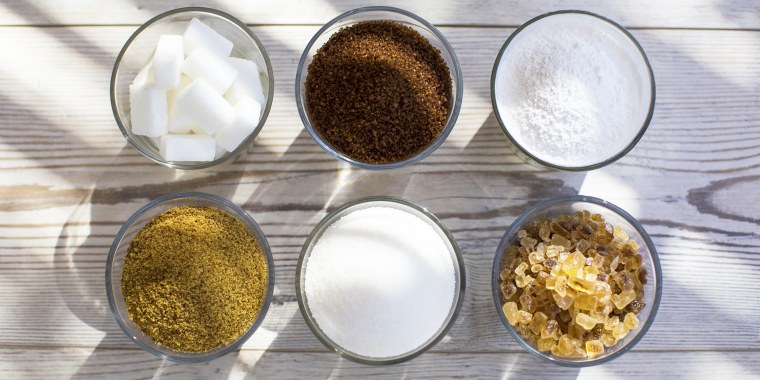When our grandparents drank coffee, they likely just reached for a bowl of plain white sugar.
We don't have that simple luxury. Instead, we're faced with choosing between white, brown, yellow, blue, pink and green packets — or even bottles — of the sweet stuff.
With so many different types of sugar (and sugar substitutes) in stores these days, there are a lot of common misconceptions out there about almost every type of sweetener on the market. Some people swear that organic sweeteners, like honey, are better for you, while others try to eliminate them all together — we're looking at you, J.Lo and Hoda!
Here are some of the most prevalent sugar myths out there, debunked by nutrition experts.
Myth 1: Brown sugar is better for you
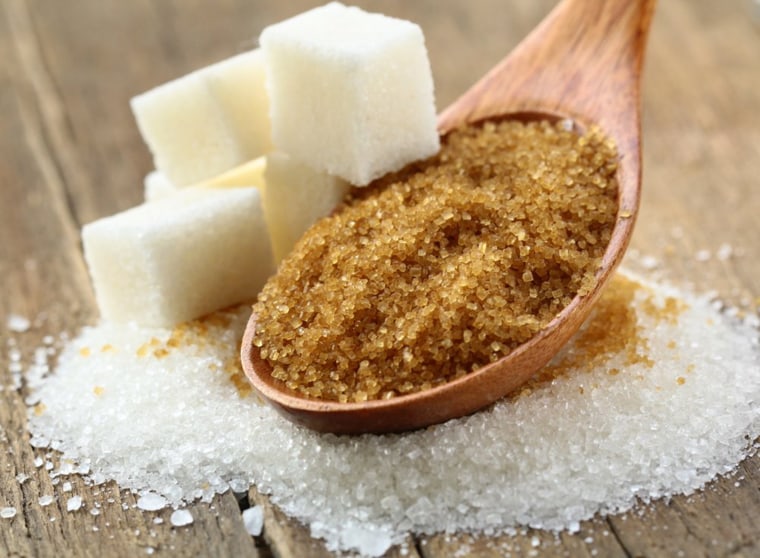
“Most people know that brown rice is healthier than white rice, and they often assume that brown sugar and other less-processed sugars are better for them than white sugar, as well,” Heather Bauer, RD, author of “The Wall Street Diet," told TODAY.
The truth? Brown sugar and white sugar are basically processed by the body in the same way. Some types of brown sugar may actually be slightly more caloric. According to the USDA, brown sugar has 17 calories per teaspoon, while its white counterpart has 16. Brown sugar gets its color from a touch of molasses — either because the sugar hasn’t been fully refined or because the manufacturer added it. It also has traces of the minerals calcium, iron and potassium, but in very limited quantities so it should still be consumed in moderation.
Myth 2: Coconut sugar is the healthiest sugar to bake with
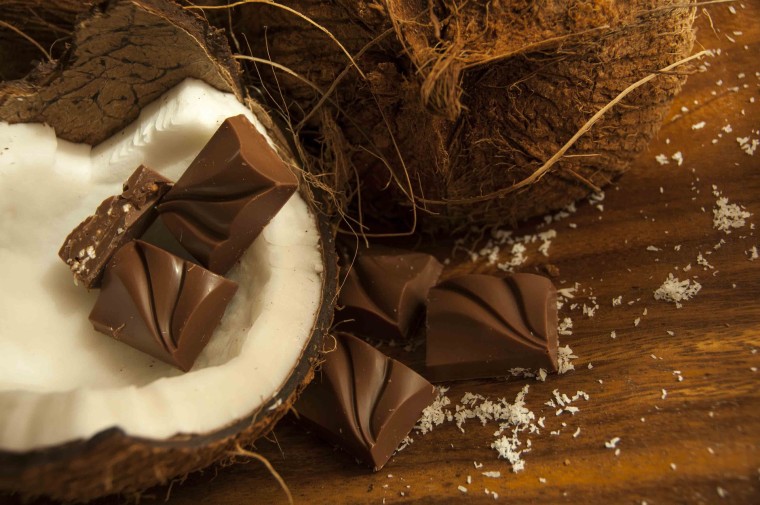
“Clients ask me about coconut sugar because they’ve heard, often from food bloggers, it’s a better option,” said Rachel Swanson, MS, RD, LDN at LifeSpan Medicine in Beverly Hills, California. Swanson attributes this misconception to the fact that coconut sugar contains additional nutrients like vitamins and minerals.
However, they’re in such trace amounts that to reap any benefits would require excessive consumption. “If my clients select coconut sugar, I tell them to consider it the same as baking with white or brown sugar," Swanson said.
Zach Cordell, MS, RDN in Daytona, Florida echoed Swanson's sentiments. “A brownie made with coconut sugar will still be a brownie with sugar in it," he said.
Myth 3: Agave and honey are "natural" so it's OK to use a lot
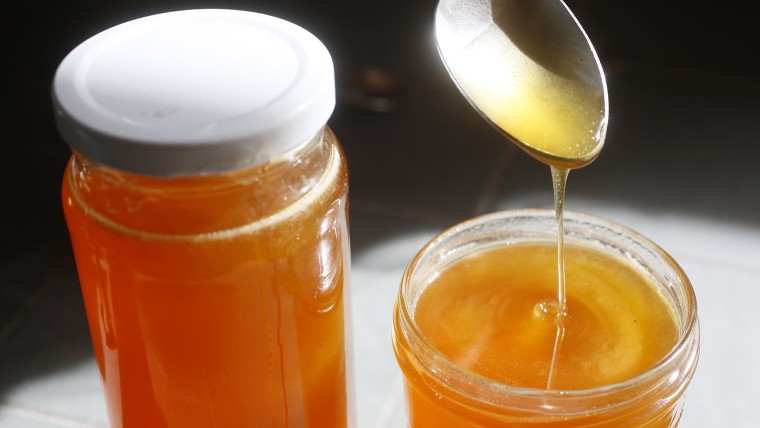
Jenn LaVardera, MS, RD says that just because something is labeled as being natural, that doesn't mean you should eat a lot of it. “I see clients overusing natural sweeteners on yogurt or oatmeal or in tea. They pour with a heavy hand because it’s natural.”
Currently, the Food and Drug Administration does not even have a clear definition for the word "natural," so it's basically meaningless. In 2016, the FDA asked consumers to help them try to develop a definition. But two years later, natural is still just unofficially defined as not having anything artificial or synthetic added. Natural should not be confused with organic food, which must meet specific requirements that have been set by the USDA.
Tablespoon for tablespoon, both honey and agave actually have more calories (64 and 49 grams, respectively) than white sugar. “Agave has a higher percentage of fructose than high-fructose corn syrup,” added Julie Lee, RD, a campus dietitian for Binghamton University's dining services.
Myth 4: Stevia is 100% natural and organic
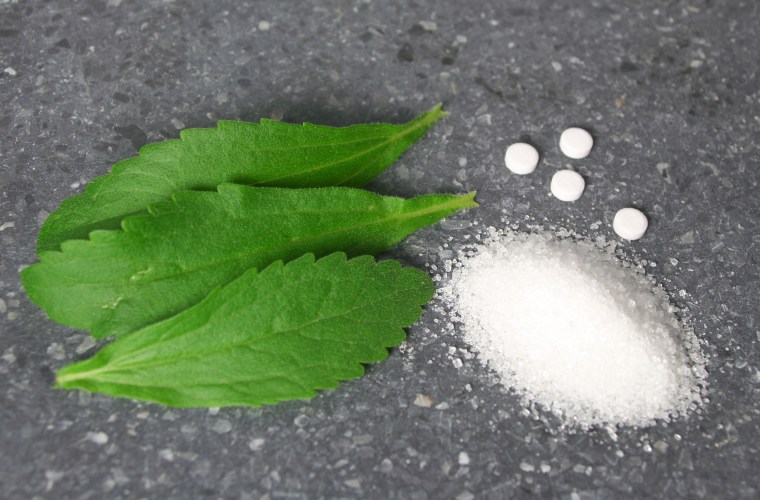
Nearly 30 years before stevia became a household name, the FDA actually banned the marketing of this South American herb as a food additive. That’s because the no-calorie sweetener they knew (and we now know) is a lot different than the stevia plant itself.
“Many of the liquid and powder extracts derived from stevia and sold to us are less than all natural or herbal, and more (the) end results of the processing and refining of the stevia herb, which removes most of the vitamins and minerals it offers as a whole plant,” said Claire Martin, RD, who specializes in holistic nutrition. “Essentially stevia sugar is no more natural than other derived sugars, like cane sugar.”
Extracting flavor from the stevia plant still requires significant processing and most commercially available forms of stevia include artificial additives to make it easier for consumers to use.
Myth 5: If it doesn't say "sugar," it's not really sugar
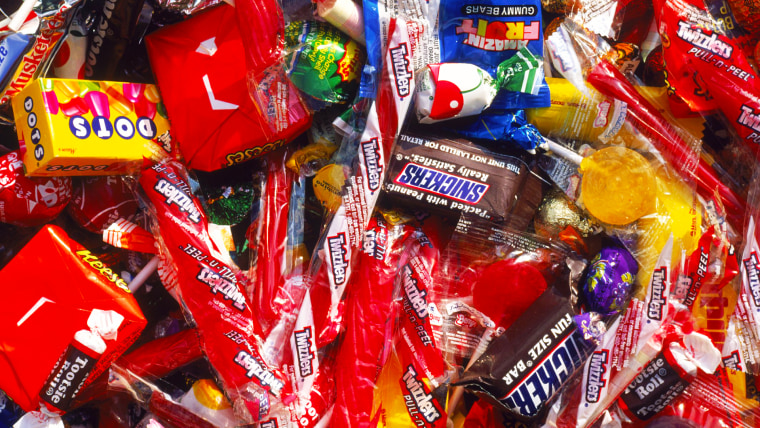
“Organic lollipops are still candy,” said Bonnie Taub-Dix, RDN, author of "Read It Before You Eat it – Taking You from Label to Table."
"It’s important to not be fooled by words like ‘organic,’ and instead, flip the package over and look at the food’s (nutrition) profile by checking the ingredient list," she said. That can be tricky, though, because there are currently more than 60 FDA-approved aliases for added sugars, including sucrose, dextrose, dextrin, golden syrup, sorghum and dozens more.
To start, Taub-Dix advises clients to look for anything ending in "ose" to indicate a type of sugar. Syrups and juices, including high-fructose corn syrup, rice syrup and organic cane juice, are also red flags if you're trying to avoid sugar.
